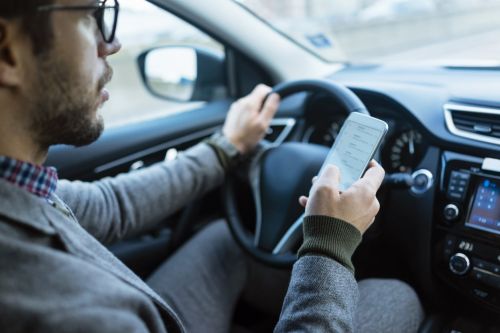Menu
Reasonable Suspicion in NC: Texting While Driving
July 31st, 2021

According to the National Highway Transportation Safety Administration (NHTSA), texting while driving is six times more dangerous than while driving while under the influence of drugs or alcohol.
The Transport Research Laboratory found that writing a text message slows driver reaction time by 35% while driving with a Blood Alcohol Content (BAC) of .08% only slows driver reaction time by 12%.
And even though most drivers know that distracted driving is dangerous, a DriversEd.com survey shows that more than half of all drivers admit to texting while driving.
We all know that driving requires concentration, and that distracted driving is dangerous. Because of the dangers associated with distracted driving, texting while driving is illegal in 48 states, Washington, D.C., and Puerto Rico.
However, distracted driving laws can be unclear and confusing, especially when we consider that many cell phones include GPS functions, hands-free, and voice-to-text technology, and that using these features while driving is not illegal.
Limits of the North Carolina Statute that Prohibits Texting While Driving
In North Carolina, it is illegal to “operate a vehicle on a public street or highway or public vehicular area while using a mobile telephone to (1) Manually enter multiple letters or text in the device as a means of communicating with another person; or (2) read any electronic mail or text message transmitted to the device or stored within the device…” N.C.G.S.§ 20-137.4A.
The statute makes exceptions for GPS and voice-operated technology.
Violating this statute can lead to fines and penalties, especially for bus drivers and commercial truck drivers.
But in order to charge you with violating North Carolina’s texting while driving law, police officers must have reasonable suspicion and probable cause to believe that you broke the law.
Appeals Court Addresses on Probable Cause Requirements to Stop a Driver Suspected of Texting While Driving
In State v. Dalton, a North Carolina appellate court ruled on whether a police officer had reasonable suspicion to stop a driver under suspicion of texting while driving.
In Dalton, a police officer observed a “more prevalent” glow coming from the suspect’s vehicle and discovered that the glow was coming from a cellular device held by the driver and sole occupant of the car. The police officer suspected the driver was texting while driving and initiated a traffic stop.
When questioned by the officer, the driver explained that he was using a mapping application. But when the driver showed the officer his phone, it immediately opened to a texting screen.
When the officer returned to his vehicle, the suspect fled the scene at a high rate of speed.
After being ordered to discontinue a high-speed chase, the officer returned to the police station to confirm the identity of the suspect. He discovered that the suspect’s driver’s license had been revoked and secured a warrant for his arrest.
Before trial, the defendant moved to suppress evidence obtained during the traffic stop that identified him as the driver of the vehicle. The court denied the motion, finding that the police officer had reasonable suspicion to stop the vehicle and investigate further.
At trial, the defendant was found guilty of fleeing to elude the police, but not guilty of texting while driving.
The defendant appealed, challenging whether the police officer had reasonable suspicion to believe he was committing the crime of texting while driving.
On appeal, the defendant argued that using a cell phone while driving is not a criminal offense and that the traffic stop was illegal because he was not engaged in criminal activity.
Ultimately, the court found that requiring a police officer to confirm the specific use of a mobile device to establish reasonable suspicion is too high a burden and would essentially mean requiring proof beyond a reasonable doubt to initiate a traffic stop. The court found that it would be unlikely that a police officer would be able to definitively determine the specific use of the cellular device before initiating a traffic stop.
Can You Fight a Ticket for Texting While Driving?
Even though texting while driving is a minor traffic infraction, paying the fine is an admission of guilt.
And while texting while driving is illegal, drivers over age 18 are allowed to talk on a cell phone while driving. And there are numerous other legal reasons for using a mobile device while driving.
Even though a conviction for texting while driving conviction will not add points to your license or increase your car insurance rates, you have the right to challenge a charge of texting while driving, especially if you believe there is no basis for the ticket.
Although texting while driving will not negatively impact your driving record on its own, if you receive another traffic violation in combination with a texting while driving ticket, an experienced traffic ticket defense lawyer can help get the charges reduced and minimize the likelihood of a license suspension.
From our offices in Salisbury, North Carolina, the Stowe Law Firm, PLLC offers a free consultation on Salisbury traffic tickets, as well as tickets throughout Rowan County, Mecklenburg County, Davidson County, Cabarrus County, and Stanly County.
Learn more about North Carolina criminal defense attorney Ryan Stowe and his criminal defense team and the cases we handle, get answers to Frequently Asked Questions, and contact us today to schedule a confidential consultation to discuss your case.
Working with the Stowe Law Firm is convenient because in most cases we can go to court on your behalf. You do not need to appear in traffic court if you hire our law firm.
Categories: Traffic Violations



